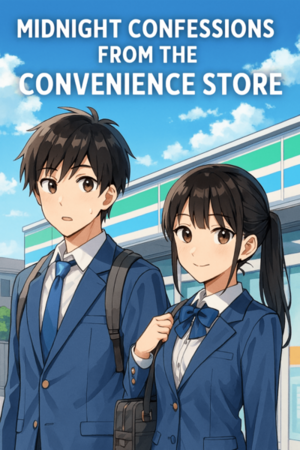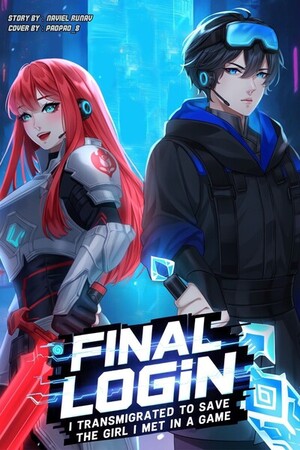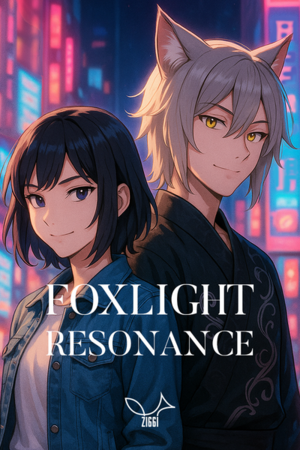Chapter 10:
After Hours at the Convenience Store
"Midnight Confessions at the Convenience Store"
The clock above the counter blinked 9:58 p.m. — two minutes until closing.
The refrigerators hummed like a tired heartbeat, steady and soft, the soundtrack of a store finally running out of energy. The Lights buzzed sleepily, casting pale halos on rows of neatly lined snacks. The air smelled faintly of floor cleaner and seaweed—our cologne of capitalism.
“Ryota,” Miyu said from behind the counter, tapping a stack of receipts. “We still have to count these before we close.”
I groaned, face-first into the register. “Can’t we just… pretend we did?”
“You could,” she replied without looking up, “if you want Manager Sato to use you as an example of what not to do with your life.”
“Pretty sure he already does that.”
She smirked, eyes flicking toward me. “Fair point.”
I dragged myself over, limbs heavy, the dayschaos pressing down like an overstocked box of rice balls. The rush hour had finally ended—salarymen, gossiping students, and one lost tourist who’d asked if we sold batteries “for their emotional support device.” (I was still thinking about that one.)
Now the aisles were empty. The store exhaled.
Manager Sato shuffled out from the back room, clutching his prized cup of instant ramen. Steam curled around his tired face like a whisper of sodium.
“Good work, kids,” he said, yawning. “You kept the place standing. That's always a bonus.”
“That’s… the bare minimum,” Miyu replied.
He nodded solemnly. “Exactly. The secret to life is barely meeting expectations.”
I raised an eyebrow. “Is that going to be the title of your autobiography?”
“Yup, it's already taken,” he said between slurps. “Working on the sequel now: Still Barely Managing.”
Miyu sighed. “Before your literary debut, could you maybe lock the back door?”
He waved lazily. “You’re closing tonight. I trust you two.”
Then he wandered off, humming the store’s jingle.
I watched him disappear. “You ever think he’s secretly a genius pretending to be useless?”
“…No,” Miyu said. “But I respect your optimism.”
While wiping down the counter, I noticed a small paper bag sitting near the receipt printer—forgotten, quiet, and slightly eye-catching.
The slip read: Mr. Tanaka — 1 Strawberry Milk + 1 Envelope.
I blinked. “The strawberry-milk addict Mr.Tanaka.”
Miyu leaned over. “It's unusual for him to forget something, here.”
Inside the bag was a folded letter and a tiny, faded photo. A younger Mr. Tanaka stood beside a woman holding a carton of strawberry milk. His usual scowl was missing; in its place was a shy smile that looked borrowed from another lifetime.
On the back, in shaky but neat handwriting:
I’ll keep buying it, just so it feels like you’re still here.
My throat tightened. The air conditioner hummed louder.
Miyu’s teasing expression softened. She refolded the photo with care usually reserved for glass. “We should keep it safe until he comes by tomorrow.”
“Yeah,” I said quietly. “He’ll want it back.”
We stood there for a while, in the presence of the coolers' lullaby. For once, the store didn’t feel like a place of concrete and tiles anymore—it felt human, the lights had softened to remember someone.
The clock clicked to 10:45 p.m.
We swept the floor, locked the breakroom door, and flipped half the switches. Darkness folded in from the corners, leaving the counter bathed in a sleepy glow.
Outside, vending machines blinked lazily along the empty street. The store sign buzzed above us, painting Miyu’s hair in electric silver. She tied it back to her usual ponytail, in a practiced motion, calm—almost ritualistic.
I should’ve gone home by now. But the quiet was comfortable, like we were both the last survivors stuck in a store during a very small apocalypse.
“Hey,” I said suddenly. “Why’d you start working here?”
She hesitated, arms crossed. “Because it’s the one place I can be myself.”
“…Meaning?”
“At school, I feel a bit suffocated, and I guess I just default to the quiet, polite, predictable Miyu Takahashi. Here, I can roll up my sleeves, yell at you when you mess up, and no one cares. I feel freedom.”
“That’s your definition of feeling freedom?”
“Pretty much.” She smiled faintly. “Freedom indeed.”
I laughed under my breath. “Guess I’m part of your freedom package, then.”
“Don’t flatter yourself.”
But there was a warmth under her tone, small and real.
We finished the checklist—counting cash, stacking receipt piles like miniature tombstones for our sanity. Miyu hummed the store jingle off-key; I joined in two notes behind. Somehow, it sounded right.
We stepped outside together. The cool night air hits us.
Miyu looked up at the glowing logo. “You know, when I first started, I thought it’d just be a normal, boring job. But it’s weird, isn’t it?”
“What is?”
"In a place that sells instant noodles and strawberry milk, you are always meeting and interacting with new people, hearing about their lives?”
I chuckled. “Maybe someone should write a book about it.”
She shot me a sidelong glance. “You volunteering?”
“Only if there’s overtime pay.”
She rolled her eyes, but her smile lingered. “Good night, Ryota.”
“Night, Miyu.”
She turned down the quiet street, the neon light fading off her hair with each step. I stood there a moment longer, looking back into the darkened windows. Inside, the coolers would keep humming till morning—like the store was still breathing even without us.
When I first walked into this place, the lights had felt too bright, too artificial—like they were daring me to mess up. Now they just looked like stars that forgot to sleep.
Tomorrow, the doors would slide open again, the same chime playing, the same shelves waiting. And somehow, that didn’t feel boring anymore. It felt like a new, exciting rhythm—like something worth returning to.
Maybe that’s what this job really was.
Not a shift.
But something more, I think.




Please sign in to leave a comment.